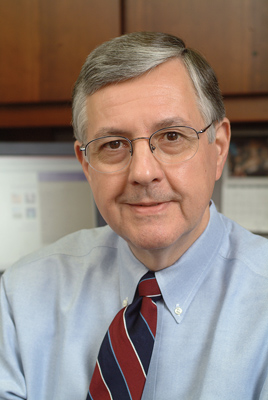By Emily Gold Boutilier
Photo by Samuel Masinter ’04
[Financial aid] Amherst’s financial aid program is regularly cited as one of the best, thanks in large part to Dean of Financial Aid Joe Paul Case, who retired in November after 31 years at Amherst. (His replacement, Gail Holt, started March 1.)

A national leader in his field, Case began his career at Oklahoma City University—his undergraduate alma mater—before moving to the College Board, where he was associate director and director of program administration at the College Scholarship Service.
“Throughout his career, Joe Paul Case has advocated for students—not just on the Amherst campus but worldwide,” says President Biddy Martin. “His dedication to access has transformed higher education, as well as countless lives.”
Charles Myers ’88 counts himself as one whose life was changed by Case. “I would not have made it through Amherst,” he says, “without Joe’s help.” Myers has created a new scholarship fund in Case’s name.
We interviewed Case—who was only Amherst’s second dean of financial aid—a month after he retired.
Case is an ordained minister in the United Methodist Church who got his first job in financial aid by chance. “I was in seminary at Yale, looking for a chaplain position,” he recalls. “Nothing developed. I went back to Oklahoma to talk about a parish appointment. Two weeks later, the new university registrar called and said the financial aid officer was leaving. My ministry has always been higher education.”
Financial aid can’t solve every student crisis, but it can go a long way—both for the student and for the community. “In Oklahoma I had a Native Alaskan student whose mom had died in childbirth,” Case says. “Her dad deserted the family. Her stepmom—the only mom she knew—was going blind. The student commuted to the university by bus, one and a half hours each way. I talked to her about living on campus, but she explained her mom’s situation. I persuaded the Bureau of Indian Affairs to provide funds to buy her a used car. I also lined up off-campus work-study. At Amherst we now spend about a third of work-study money off campus, mostly [for students to do] community service. You can make the aid program not only benefit the student but also work for the broader society.”
A brochure from the 1890s reveals that, out of 20 liberal arts colleges listed, only Amherst had financial need as the sole measure for aid. “At Amherst, need has always been the criterion,” Case says. Amherst was one of the first U.S. schools to adopt need-blind admission, to give all students the full amount of aid that the college determines they need, and to eliminate loans. “Those are costly propositions,” he says. “For the trustees to support them is remarkable.”
Decreased federal funding and low family savings are among the major challenges facing financial-aid directors nationwide. “State governments are in even worse shape,” he says. “And many families don’t save adequately for college.” He says colleges must continue to make the case for the liberal arts. “What of the philosophy major?” he asks. “It will be a challenge, in a Congress that is career-oriented, to fund the liberal arts.”
Case’s retirement plans include organizing his 5,000-volume home library. “I’m still working in the financial aid office a fair amount,” he adds. “I am also Western Mass. Council president of the Boy Scouts of America. And this year, I’m [officiating at] two weddings. Sooner or later I might actually sleep late, although that hasn’t happened yet.”